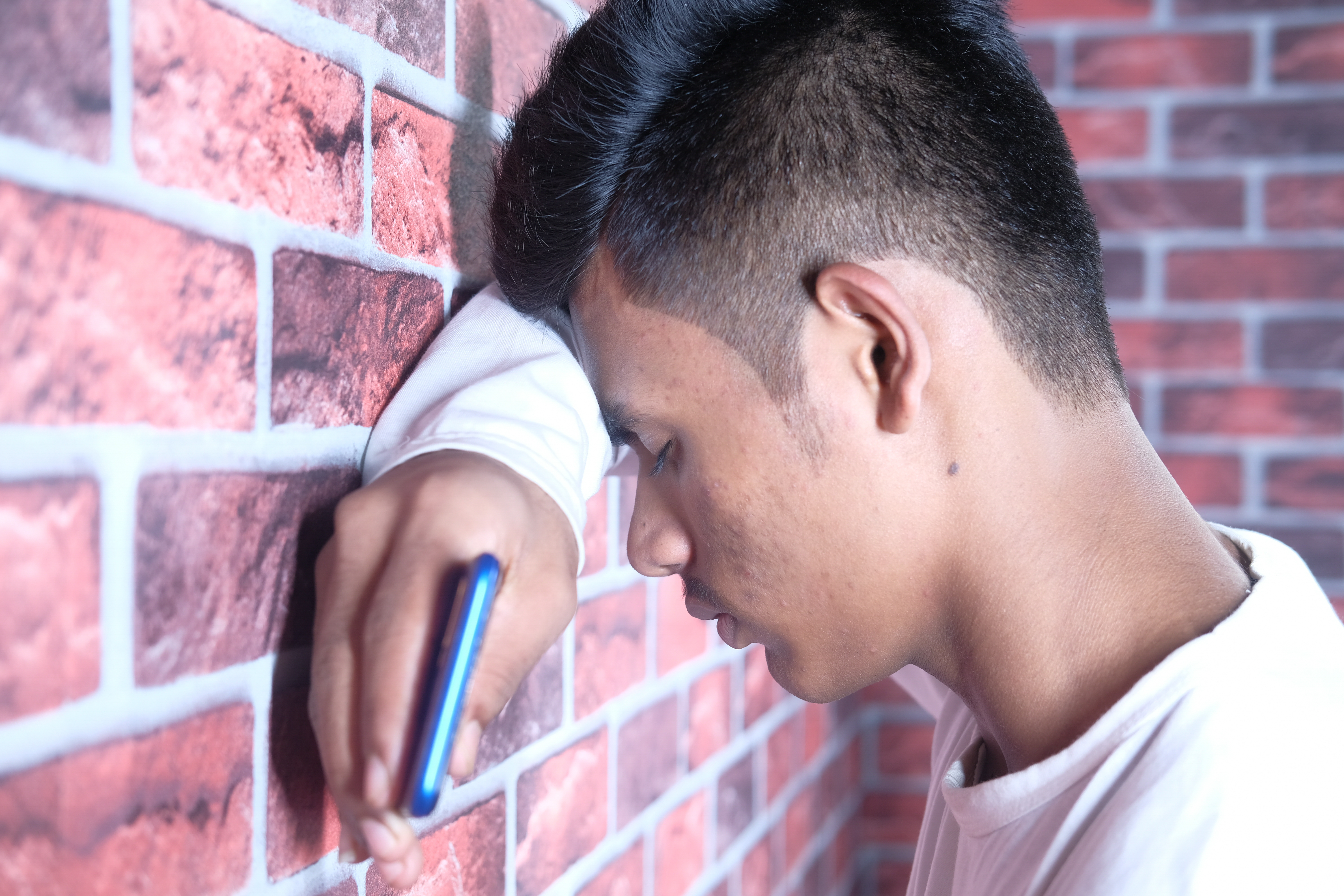ADVERTISE HERE
Follow us on Instagram, TikTok, and WhatsApp for the latest stories and breaking news.
A survey done by the Malaysian Institute of Public Health revealed that one in every five pupils admitted to being a bully, indicating that cyberbullying is a serious problem in Malaysia
Additionally, according to the 2022 Malaysian Communications and Multimedia Commission (MCMC) survey, 40% of respondents have experienced cyberbullying, with a greater frequency (55%) among those aged 13-17.
With growing accessibility to the Internet, online harassment is just as harmful as traditional bullying.
Malaysia's high cyberbullying rate is exacerbated by widespread Internet use, which exceeds 80% of the population, and broad use of social media. Tragically, a 2019 incident involving a 16-year-old Sarawakian girl's suicide due to cyberbullying revealed the global magnitude of the problem.
 Image used for illustration purposes only.
Image via feelimage / Vecteezy
Image used for illustration purposes only.
Image via feelimage / Vecteezy
So, what can you do to protect young ones from cyberbullying?
One critical measure is to educate yourselves on the issue as parents, teachers, and students. This involves training children how to recognise and respond to cyberbullying's signs and symptoms.
Another critical aspect is to provide pupils with a safe and supportive environment. This entails developing a school and home culture in which students feel safe discussing cyberbullying with teachers and trusted adults. This also entails establishing clear policies and procedures for dealing with cyberbullying.
Finally, pupils must be taught about digital citizenship. This includes teaching kids how to use the Internet securely and responsibly, as well as how to treat others online with respect.
 Image used for illustration purposes only.
Image via siri wannapat / Vecteezy
Image used for illustration purposes only.
Image via siri wannapat / Vecteezy
If you're worried that your child is being cyberbullied, there are some warning signs you can look out for
It is critical to recognise the indications of cyberbullying to protect yourself and your loved ones.
If your child spends more time than normal on their smartphone or deletes their social media accounts, it could be an indication that they are striving to avoid cyberbullying. Teenagers who appear frightened or apprehensive when they get a text message may also be a victim.
Teenagers may appear upset or enraged after using their smartphones, or they may give excuses to miss school. They may also refuse to attend social gatherings if they are embarrassed or ashamed of what is occurring to them online.
 Image used for illustration purposes only.
Image via siri wannapat / Vecteezy
Image used for illustration purposes only.
Image via siri wannapat / Vecteezy
Extreme mood fluctuations, alongside loss of interest in previously loved activities, may be signs that they are attempting to cope with cyberbullying. Furthermore, insomnia is a sign that they are stressed or anxious.
Children's references to self-harm must also be taken seriously, and help should be sought promptly.
But why don't teenagers report cyberbullying?
Many teenagers would rather suffer alone than risk exacerbating the situation, convinced that if they remain silent, the bullying will end. Teens also tend to believe that their parents expect them to solve problems on their own.
Teens frequently believe that they must endure bullying on occasion to feel like they belong. As a result, they submit to peer pressure and accept bullying to maintain their social standing.
 Image used for illustration purposes only.
Image via Towfiqu ahamed barbhuiya / Vecteezy
Image used for illustration purposes only.
Image via Towfiqu ahamed barbhuiya / Vecteezy
Furthermore, a youngster who is highly critical of themselves or lacks self-esteem may believe the bully's statements and hence accept the abuse. This mix of peer pressure and bullying is common among friends.
Bullying victims are typically more afraid of being labelled as a tattletale, baby, or snitch than of being abused repeatedly, so they remain silent. Since the person performing the bullying is often anonymous or unknown, children are unsure whether reporting the cyberbullying will stop it.
As they do not want to be denied access to their devices because they are being bullied, this sends two messages — that it is not worth telling an adult, and that the victim should carry the brunt of the punishment.
Cyberbullying can have a significant emotional and psychological impact on victims
 Image used for illustration purposes only.
Image via Maliwan Prangpan / Vecteezy
Image used for illustration purposes only.
Image via Maliwan Prangpan / Vecteezy
Victims may suffer grief, fear, wrath, and embarrassment. They may also struggle to sleep, concentrate, and trust people. Cyberbullying can even cause sadness and suicidal thoughts in certain people.
It also harms a victim's academic achievements and social ties. Victims may skip school, avoid social events, and withdraw from friends and family. They may also be more prone to dangerous behaviours like substance misuse and self-harm.
If you suspect your adolescent is being cyberbullied, there are various things you may do to assist them
Firstly, it is critical to remain calm and communicate with your child about what is going on. Assure them that you are available and will assist them in stopping the bullying. Responding to the bullying rashly will only exacerbate the problem.
Next, collect evidence of the bullying. This could include screenshots of communications, photos, or videos. You should also keep track of the incidents' timelines.
 Image used for illustration purposes only.
Image via Freepik
Image used for illustration purposes only.
Image via Freepik
After gathering evidence, you can report the bullying to the social media network or website where it is occurring. You can also notify the victim's school about the bullying, as schools are responsible for addressing and protecting pupils from cyberbullying.
If the cyberbullying is occurring outside of school, you can make a police report, as the authorities may be able to investigate and take appropriate action against the bully.
Finally, get your child expert help. A therapist can assist your child in coping with the emotional effects of cyberbullying, as well as in developing coping techniques against bullying.
On the flipside, if you find that your child is the one cyberbullying others, there are also steps you can take to help the situation
Bullying should be taken seriously. Don't ignore it, nor should you brush it off as "childish behaviour".
You must understand that anyone, including your own child, can be cruel to others. The primary goal is to put an end to the situation as soon as possible, regardless of who started it or why.
Make efforts to eradicate your child's involvement in the matter, besides any impact your child may have on other collaborators.
Bullies frequently act out because of an underlying difficulty in their lives. It could be something at home, school, or their health. To understand why people abuse others, get to the source of the problem.
 Image used for illustration purposes only.
Image via rawpixel.com / Freepik
Image used for illustration purposes only.
Image via rawpixel.com / Freepik
Sit your youngster down and ask them to imagine themselves in the shoes of their victims. Educate them on the consequences of their behaviour and encourage them to be empathetic to others.
Bullies will sometimes target victims because of perceived disrespect. Explain that there are better methods to handle conflict than seeking vengeance over trivial matters. Encourage open discussion about difficulties, and provide your child with guidance, resources, and opportunities to overcome problems in more constructive ways.
Limit your children's access to devices and the Internet, and keep an eye on their online activity. You can stay on top of any problems and prevent bullying from recurring by conducting random checks and weekly check-ins to discuss any difficulties.
Cyberbullying is a severe issue in Malaysia. However, it is vital to realise that it can be avoided.
We can contribute to creating a better online environment for everyone by educating youngsters about cyberbullying and digital citizenship.
This story is a personal opinion of the writer and does not necessarily reflect the position of SAYS.
You too can submit a story as a SAYS reader by emailing us at [email protected].
Renuga Kuppusamy is an experienced English teacher with a passion for education and a strong dedication to her pupils' well-being. She has spent 11 years teaching at the secondary school level in Johor Bahru, where she works every day with teenagers aged 13 to 17.
She believes that harnessing digital tools to enhance the learning experience can make education more engaging and successful. Renuga aspires to offer a secure and friendly learning environment in which students may appropriately navigate the digital world.









 English (US) ·
English (US) ·